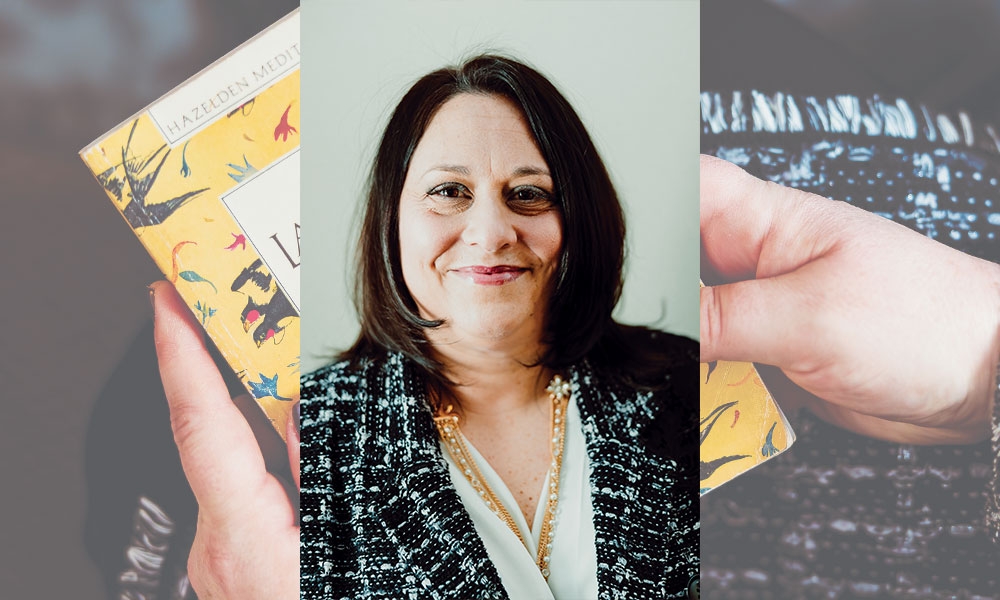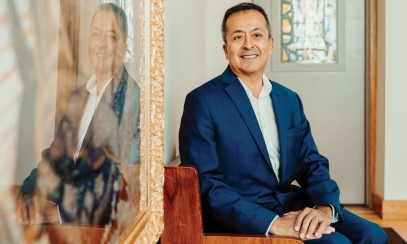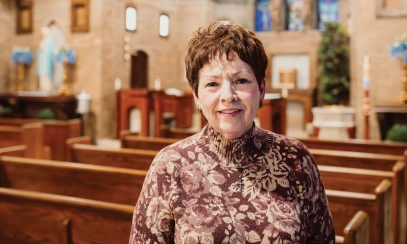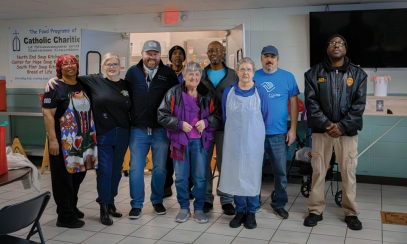
"God knows what we need"
For counselor Holly Carter, miracles are a daily occurrence.
For counselor Holly Carter, miracles are a daily occurrence.
It’s a cold winter morning at Livingston County Catholic Charities (LCCC). Foot traffic is heavy, and each time the door opens a frigid breeze blows into the waiting area.
Inside Holly Carter’s office, however, cozy warmth pervades. Sinking into the comfort of her cushioned chairs, soft lights, and book-lined walls, it’s easy to forget the icy winds of winter.
It’s an environment that nourishes the soul—and a space that’s witnessed extraordinary work between Holly and the people she serves. Originally a businesswoman employed by the former DaimlerChrysler corporation, Holly is now a skilled substance abuse therapist with a full client load.
“My oldest has been diagnosed with autism, and he's significantly impaired. He’s nonverbal and requires full care,” Holly says. “My work here began when I got involved in a lot of social work for kids with disabilities, just to process my grief and loss. Through that, I decided to return to get my master's degree and focus on a professional career.”
Ultimately, Holly’s work led her to specialize in substance use disorder support for LCCC clients.
“Grief and loss make up a very big piece of the work that’s needed for people experiencing substance use challenges,” she says. “When we think of the 12 steps, which we very much use here, there’s a strong focus on processing heartache and loss. Before you can really, truly get to acceptance, you must process all those feelings.”
The key, Holly says, is to help clients understand why they are using substances as a coping mechanism.
“Typically, there's some type of reason,” she says. “And I can really relate to people in that situation. I know what it feels like to struggle with not really knowing how you feel about yourself and confusing that with how you're going to help yourself or move forward. My clients often grieve the fact that substance use issues are forever, and their lives are never going to be the same again. They need to process their feelings and understand their needs moving forward.”
Holly usually has a heavy caseload, with anywhere between 45 and 50 clients at a time. And since the pandemic, those numbers have grown considerably.
“I've seen an uptick in substance use disorders among older adults in particular,” she says. “Some people were displaced. They either retired early, and maybe they had an issue, but they were working every day, and there were other things keeping them somewhat in check, the routine, and then the routine is gone.”
Despite her growing client load, Holly and her team have achieved a great deal of success.
“One of my favorite clients is Cynthia,” Holly remembers. “She's just such an incredible person, and really an inspiration, I think, to a lot of people. When she came to us, she was 60 years old and dealing with a lot of the effects of long-term alcohol use. She was alcohol dependent, so she had to go through a severe withdrawal when she started treatment with us.”
Because Cynthia was unable to go to an inpatient facility, Holly became her first line of defense against substance use disorder.
“She was able to leverage her own strong Catholic faith, the support of group sessions and AA, and became a very healthy part of our community. She’s worked on her finances, her physical health, and her own wellbeing and is in a very good place now. In fact, we keep trying to coerce her to come here to work, but she's not there yet. One day, she probably will be.”
Holly also thinks back on Harold*, a parolee with anger issues.
“When I first met him, I really thought, ‘I don't know how much work we're going to be able to do in 90 days,’ which is the maximum they have to attend by law,” she says. “But he really connected. He got involved with AA, and he created new loving relationships that are healthy, and he's still in recovery. He works, and he still will send me pictures sometimes of his family.”
Holly says faith-based programs offer better overall recovery outcomes (according to The Journal of Religion and Health, more than 84 percent of scientific studies show that faith is a positive factor in addiction prevention). DSA funding of faith-based counseling is, therefore, a huge reason for LCCC’s success.
“Because of DSA, our salaries can be paid, so we can have substance use disorder recovery groups here several times a week,” Holly says. “We can share our faith in our work and conduct an immense amount of outreach in our community. We talk to God and identify God as the higher power with our clients. Certainly, we have people that come here that are agnostic, and we're not going to turn them away, just like we don't turn away people that are not Catholic. But we are very clear about what we believe in here and we don't shy away from that. It's 100 percent of our work, and we talk about it all the time.”
The mission of Catholic Charities in the Diocese of Lansing is the work of the Catholic Church: to share the love of Christ by performing the corporal and spiritual works of mercy
-
CATHOLIC CHARITIES OF JACKSON, LENAWEE AND HILLSDALE COUNTIES
- Jackson: 3425 Francis Street, 517.782.2551
- Adrian: 199 N. Broad Street, 517.263.2191
- Hillsdale: Call 517.263.2191 for an appointment
-
CATHOLIC CHARITIES OF SHIAWASSEE AND GENESEE COUNTIES
- Owosso: 1480 N. M-52, Suite 1, 989.723.8239
- Flint: 901 Chippewa Street, 810.232.9950
-
CATHOLIC SOCIAL SERVICES OF WASHTENAW COUNTY
- Ann Arbor: 4925 Packard Road, 734.971.9781
-
LIVINGSTON COUNTY CATHOLIC CHARITIES
- Howell: 2020 E. Grand River Ave., Suite 104, 517.545.5944
-
ST. VINCENT CATHOLIC CHARITIES
- Lansing: 2800 W. Willow, 517.323.4734
-
CRISTO REY COMMUNITY CENTER
- Lansing: 1717 N. High St., 517.372.4700
1 Real names not used
2 https://link.springer.com/article/10.1007/s10943-019-00876-w
2020 E. Grand River, Suite #104
Howell, MI 48843
Main Office Phone: 517-545-5944
Be Our Guest Adult Day Phone: 517-546-9910
*For 24 hour substance abuse case management services, call Jessica, Clinical Case Manager, at 517-375-1652.



